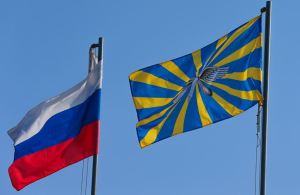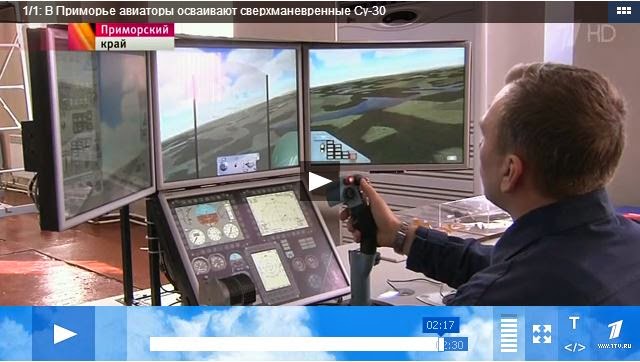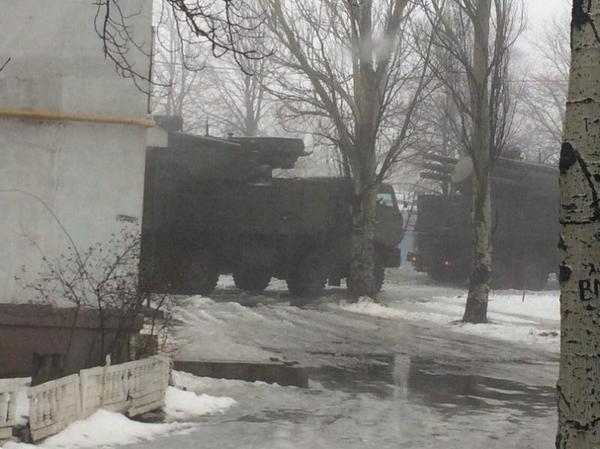Found this Russian article, but someone had already blogged about it, so here is the English that
Russian Defense Policy wrote about...interesting, just another reform...we'll have to see if they can actually stick with the VKS, VVKO, or whatever...it would be like renaming the US Air Force to the US Aerospace Defense Force. That would stick for about a week.
TASS article at the bottom,
http://itar-tass.com/armiya-i-opk/1655519 (with machine language...I didn't feel like translating it because who knows if it will happen)
https://russiandefpolicy.wordpress.com/2015/01/01/aerospace-forces/
At some point, probably next summer, the Air Forces (VVS) will cease being one of Russia’s three armed services. The Aerospace Forces (VKS or ВКС) will take their place. The Aerospace Defense Troops (VVKO) will likewise disappear as a branch and get rolled into the new VKS. Russia will be left with three services and two branches (not three of each).

RF and Air Forces Flags (photo: Mil.ru)
The Aerospace Forces will be responsible for all Russian air forces and air defense (and more).
This news comes on the heels of six months of studious MOD denials that such a move was even contemplated.
It began quietly on 1 December with Defense Minister Sergey Shoygu’s remarks to a regular military leadership videoconference.
According to
Krasnaya zvezda, Shoygu discussed changing the organizational structure of the Air Forces in connection with turning VVKO
aerospace defense brigades back into air defense (PVO) divisions. He said the decision was made in mid-2013 after an analysis of mission fulfillment by the Air Forces. He explained that:
“The goal of the changes being made is to increase the effectiveness of VVS [Air Forces] command and control, to improve the quality of the organization of everyday activity and planning for the combat employment of the troops.”
It echoed an earlier decision to reverse course on Anatoliy Serdyukov’s large composite air bases and groups and put aircraft back into more dispersed divisions and regiments.
By 10 December, Interfaks-AVN reported that the decision to replace the VVS with the VKS awaited only an official announcement.
The news agency’s MOD source said:
“Formation of the new service [VKS] will proceed gradually, and, as expected, take several years. In the course of this period, the forces and means entering the VKS must develop in the direction of unification and standardization of command and control, information and strike systems.”
The source also claimed the first CINC of the new service would be a general officer with experience commanding large inter-service [unified or joint] troop groupings, including aviation and PVO. The most likely candidate — according to the source — Central MD Commander General-Colonel Vladimir Zarudnitskiy.
Then Defense Minister Shoygu made it official on 18 December when he said creating Aerospace Forces would be a priority task for 2015.
TASS reported the VKS CINC will have deputies for aviation, air defense, missile defense (PRO), and space. It also indicated that VKS will control all current VVS aviation, including frontal and army aviation. But its sway over the latter two — with the exception of fighter aircraft — will be “purely nominal,” and they will be employed in “coordination” with MD commanders. Troop PVO will apparently continue to protect army formations.
Military commentator
Igor Korotchenko captured the essence of VKS as a reaction to the possibility of a devastating U.S. aerospace attack on Russia:
“The main function [of VKS] is to guarantee realization of the Russian Federation’s concept of aerospace defense, proceeding from the need to counter existing plans, particularly of the United States of America, to implement the prompt global strike concept. The Americans are planning in the conceivable future to use precision weapons, including hypersonic ones, to destroy [launch] positions and silos of intercontinental ballistic missiles, command centers, communications centers. The fact here is that this concept will potentially be a great threat for Russia. These new structures, the new service of the Russian armed forces will be occupied with its deterrence and neutralization.”
Such a potentially disarming threat might mobilize the military and public against America, but Korotchenko and the VKS will have to wait a very long time for it to materialize. And if it doesn’t appear, then the deterrent worked, right? A no-lose proposition from Moscow’s perspective.
VKS will be something of an effort to resurrect or reconstruct Soviet PVO Strany — national air defense — that was dismantled beginning in the late 1970s. Serdyukov’s reorganization of the VVS and creation of VVKO are criticized now as focused solely on saving money. The current thinking is that all aerospace defense systems should be concentrated in a single service and single CINC with authority and responsibility for protecting the country’s aerospace borders.
The new VKS will be anything but compact, as President Putin often calls on the army to be. They will be a sprawling enterprise that may be challenging to link and inter-connect for operations as a unified command. If Serdyukov’s changes were too economy-minded, this one errs on the side of Soviet-style giantism. And now isn’t an auspicious time for expensive undertakings.
There are practical issues too. How will the VKS CINC manage competing requirements for modern fighter aircraft from frontal aviation and air defense?Their number is limited and insufficient for both needs. So creation of VKS won’t change the fact that they will be spread thinly over a gigantic landmass.
Moral of the story: Reform, reorganization, and reshuffling never really end no matter the boss — Serdyukov, Shoygu, etc. VKS may be the answer for a time, but they’re very unlikely to be the last word.
P.S. Various reports on VKS provided some indication of deployments in 2015. What is currently the VKO brigade (or will become a PVO division) in Novosibirsk may receive the
S-400 this summer. Shoygu said the MOD will put an air and air defense army (AVVSiPVO or АВВСиПВО) in the Arctic. More recently,
TASS reported an S-400 regiment will be deployed on Novaya Zemlya.
МОСКВА, 18 декабря. /ТАСС/. Воздушно-космические силы (ВКС) будут сформированы к лету 2015 года. Они будут состоять из авиации, сил противовоздушной и противоракетной обороны, а также космических войск, сообщил ТАСС высокопоставленный источник в Минобороны РФ.
Ранее главком ВВС Виктор Бондарев рассказал журналистам, что ВКС планируется создать к началу 2016 года.
"Решение о формировании ВКС за счет включения в них ВВС и войск воздушно-космической обороны (ВКО) в полном составе принято на самом высоком уровне, сейчас проводятся организационные мероприятия, новый вид вооруженных сил должен начать функционировать с лета 2015 года", - сказал собеседник агентства.
Три вида и два рода войск
Таким образом, отметил источник, после реорганизации в Российской армии останутся три вида (ВКС, сухопутные войска и ВМФ) и два рода войск (РВСН и ВДВ). Он пояснил, что главкому ВКС будут подчинены авиация, силы противовоздушной (ПВО) и противоракетной обороны (ПРО), а также космические войска. Их возглавят его заместители.
Авиация ВКС, по словам источника, будет включать все рода авиации нынешних ВВС, включая армейскую. Однако фронтовая и армейская авиация, кроме истребителей, будет входить в ВКС "чисто номинально", заявил собеседник агентства. Фактически, пояснил он, она будет применяться в соответствии с планами командующих войсками военных округов.
Что касается сил ПВО и ПРО воздушно-космических сил, то, как сообщил источник, "они будут включать все имеющиеся сейчас в составе ВВС и войск ВКО средства ПВО страны, включая вновь сформированные в обеих структурах дивизии ПВО, а также существующие и разрабатываемые системы ПРО".
Космические же войска "вберут в себя все, касающееся запуска космических аппаратов, управления орбитальной группировкой, системы предупреждения о ракетном нападении в составе наземного и космического эшелонов и контроля космического пространства", добавил он.
Собеседник агентства подчеркнул, что сухопутные войска не будут участвовать в создании ВКС. "Ни части войсковой ПВО, ни ракетные войска и артиллерия, включая комплексы "Искандер", ни какие-либо другие средства сухопутных войск в состав ВКС не включаются", - заключил он.
MOSCOW, Dec. 18. / TASS /. Aerospace force (FSI) will be formed by the summer of 2015. They will consist of aviation, energy, air and missile defense and space forces, told Tass high-ranking source in the Russian Defense Ministry.
Earlier, Air Force Commander Viktor Bondarev told reporters that videoconferencing is planned to create the beginning of 2016.
"The decision on the formation of videoconferencing to include them in the Air Force and Aerospace Defense (ASD) at full strength taken at the highest level, are now carried out organizational activities, a new kind of armed forces should become operational in the summer of 2015," - said agency.
Three species and two genera of troops
Thus, the source said, after the reorganization of the Russian army will remain three types (FSI, the Army and Navy) and two kinds of forces (the Strategic Missile Forces and Airborne). He explained that the commander in chief of videoconferencing will be subject to aircraft, air force (NORAD) and the Anti-Ballistic Missile (ABM), and space forces. They are headed by his deputy.
Aviation videoconferencing, according to the source, will include all kinds of current Air Force aircraft, including the army. However, the front and army aviation, except for fighters, will be included in VCS "purely nominal," the source said. In fact, he said, it will be applied in accordance with the plans of the commanders of military districts.
As for air defense and missile defense aerospace forces, as the source said, "they will include all available now as part of the Air Force and air defense EKR countries, including the newly formed in both structures Air Defense Division, as well as existing and emerging missile defense system ".
Cosmic forces as "vberut in all concerning the launch of spacecraft constellation management, Early-warning radar as part of ground- and space-tier and space control," he added.
The agency's interlocutor said that the Army will not participate in the creation of video conferencing. "No part of the army air defense or missile troops and artillery, including complexes" Iskander "or any other means of ground forces in the VCS does not include" - he concluded.












